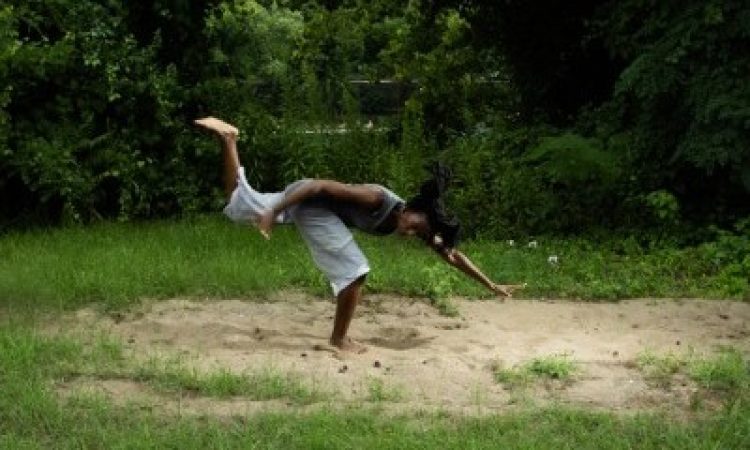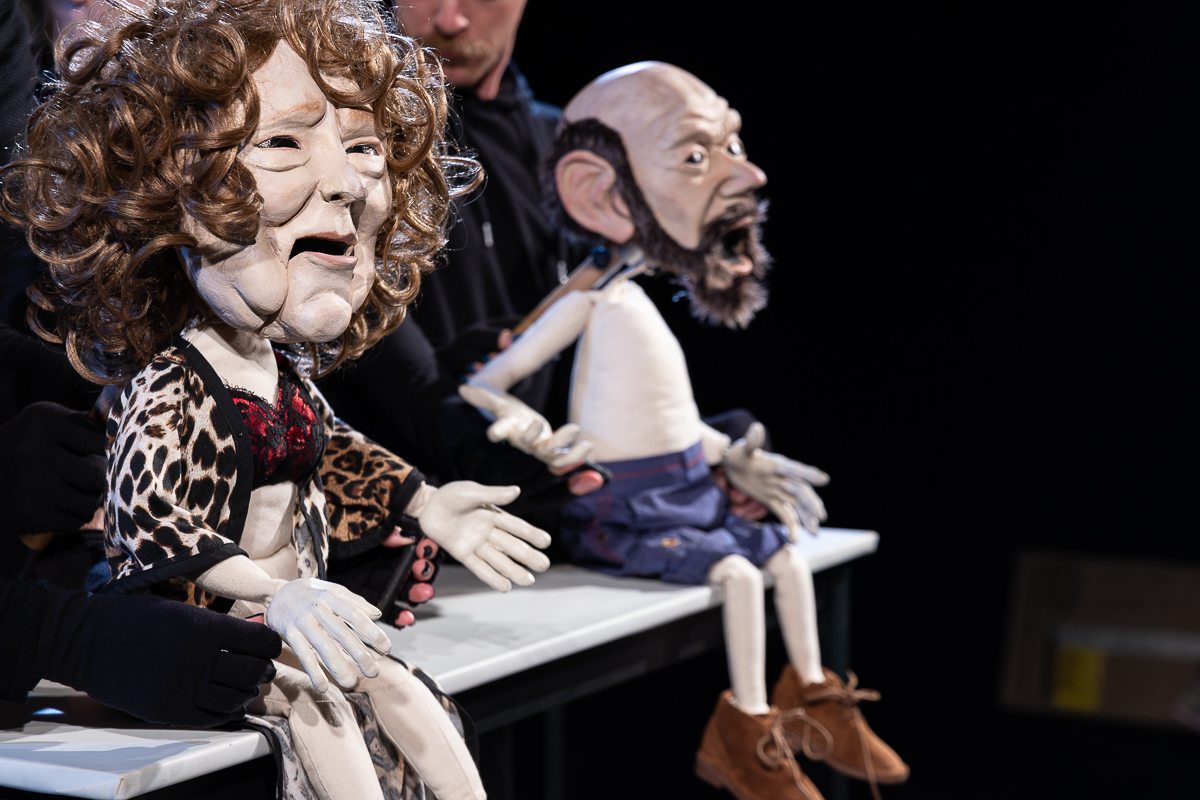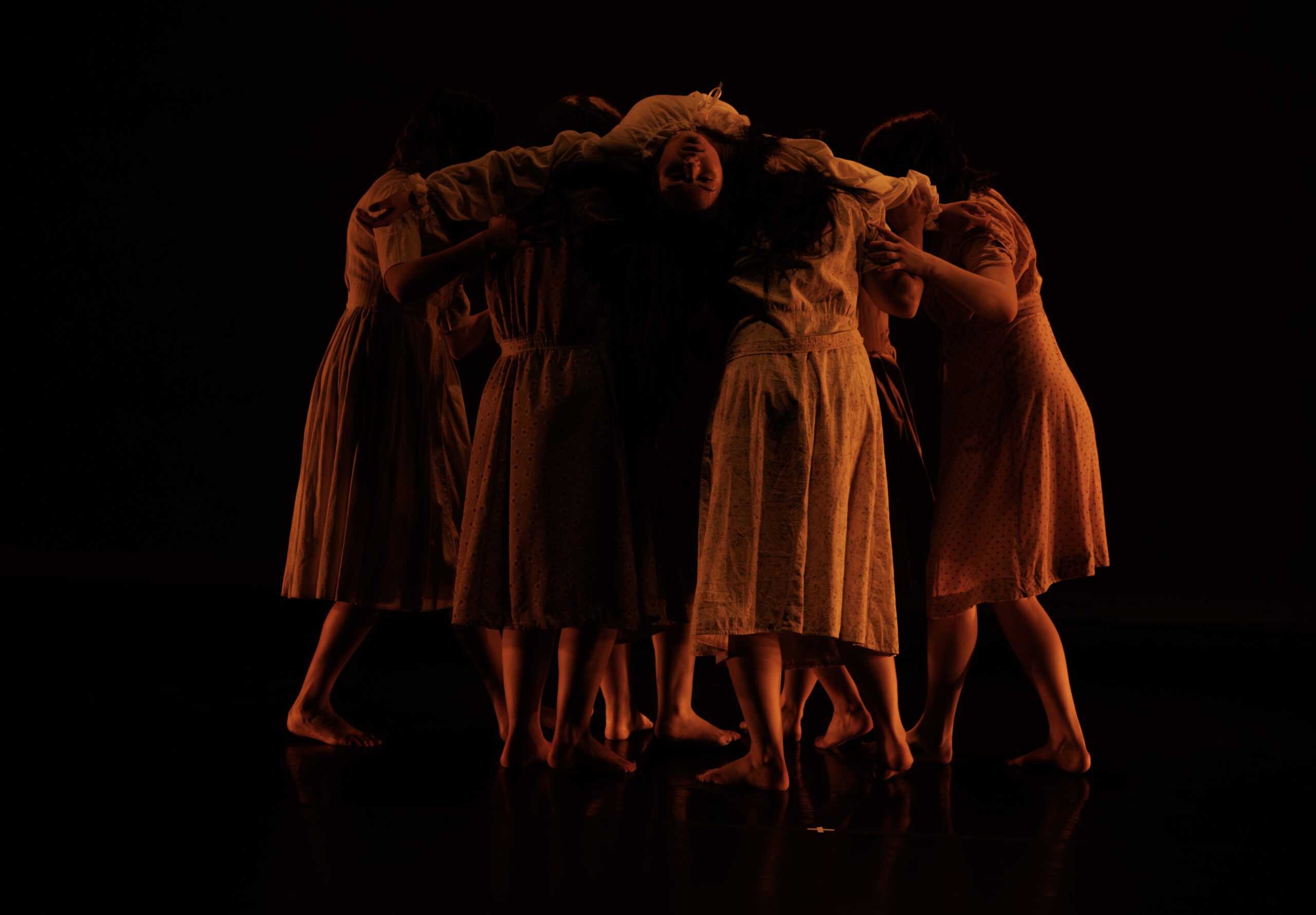In a gradual awakening, Marguerite Hemmings lies on the floor of the black box at Theatre Exile. It’s the second night of their show Make Ready Again, supported by Journey Arts. Making subtle shifts and adjustments, their movement is soothing and slow; a primal impulse exploration. They lie on their back, with all four limbs suspended in the air before collapsing to the floor. Rolling to their stomach, Hemmings curls into the fetal position. Their focus seems mostly internal, though sometimes directed upward at a stringy web suspended overhead. Gestures that mimic “the itsy bitsy spider” catch my attention – Hemmings’ hands meet as their fingers climb up one another beneath the web. This new dexterity contrasts the more nascent, instinct-driven unfolding from the beginning of the dance. Later in the work, Hemmings gives some context: “where I’m from, spiders inspire rebellion.”
“Jamaica. 1988. Kingston.”
Hemmings recounts their family’s immigration story when prompted sternly by their shadow (voiced by Micah Lat) to tell the audience about themself. “We left…We might not have wanted to. It’s my father’s fault…or the British. He left. He left. He left… He left us with his debt.” The double entendre stays with me. Later, Hemmings encourages the audience to guess how much literal debt Jamaica is in. The number is upwards of $13 billion. Hemmings carries the heavy load of that debt in their movement and posture. Hunched over, slowed down, struggling to stand or move, they bear the metaphoric weight of the $13 billion.
Hemmings single-handedly acts out an argument about debt, pointing out the ways that ego and greed prevent cooperation. A sequence of finger-pointing, rejected barter offers, and failed attempts at compromise result in the question of cultural currency. By request, the indebted party begins to share about their culture, proudly explaining the complexities and diasporic intersections of triplets in Funk music and polyrhythms of Afrobeats, Dancehall, and House. A voiceover recording of Toni Morrison begins playing in the background:
“For there is a deadly prison: the prison that is erected when one spends one’s life fighting phantoms, concentrating on myths and explaining, over and over again, to the conqueror: your language, your lifestyle, your history, your habits. And you don’t have to do it anymore. You can go ahead and talk straight to me.”
…a reminder that there is no use in negotiating when the goal is profit, not exchange. In these exploitative, hyper-conditional and capitalist practices, cultural appropriation can become nearly consensual.
The shadow returns. The echoey voice initiates an inner dialogue from a captious, blunt, unapologetic, sometimes offensive, and slightly sarcastic stance. Hemmings and the shadow argue. They scream. They let go. In a vulnerable moment, Hemmings addresses the shadow’s feelings of abandonment and recognizes the debt owed to their shadow self is attention and consideration.
“What do we do after the debts are paid?”
Sound, voice, and movement join forces in a live rendition of “You Don’t Love Me” by Jamaican vocalist Dawn Penn. Accompanied by musicians (Trumpet Wom, Max Ilan Hoenig, Ajay Shughart, Lee Clarke, Lenny Mobley, JONILL) and Daniel Woods on vocals – an uninhibited Hemmings, disruptively and unapologetically generates an electrifying presence, channeling vitality and rupture. A much more raw and unruly movement repertoire than we had seen previously was activated in all its glory. From standing on a chair to falling to their knees, writhing, flailing, jumping, jiving, swinging, and shaking, a stunning hurricane of emotive and explosive energy is exchanged between the musicians, vocalist, mover, and audience. An invigorating experience, I think, for all involved. I think of this moment as an embodied answer to the Morrison quote from earlier, when she said “go ahead and talk straight to me”. Hemmings held nothing back.
Make Ready Again offers an introspective honoring of the daily contestations with one’s own ego. The dance theatre piece invokes a reckoning with one’s own areas of self-abandon. The view of reparations as solely material debt with rigid conditions gets left where it belongs: as colonizer’s business. Through a celebration of the liberated body, voice, and sound in concert with one another, repair comes framed as a concept and lifestyle equipped with self-reflection and care. Liberation is more than a transaction. As the shadow asks:
“What is justice without love? What do we do after the debts are paid?”
Make Ready Again, Marguerite Hemmings, Theatre Exile, Dec. 5-7.






